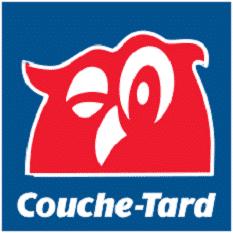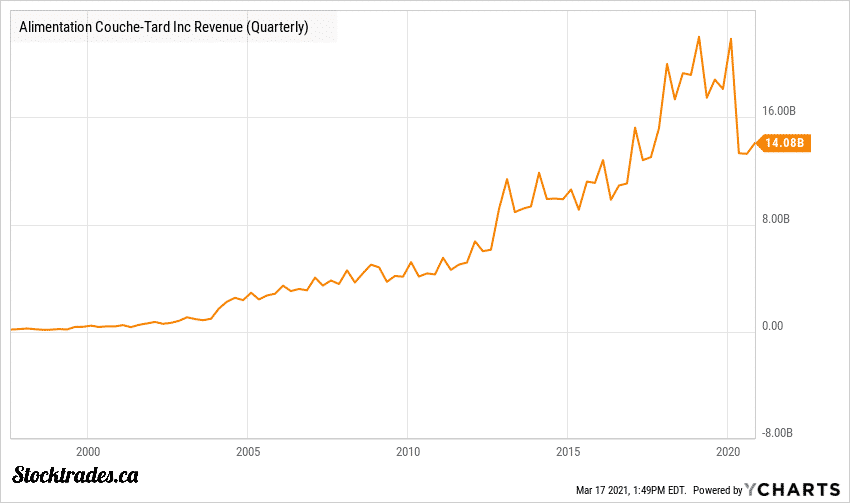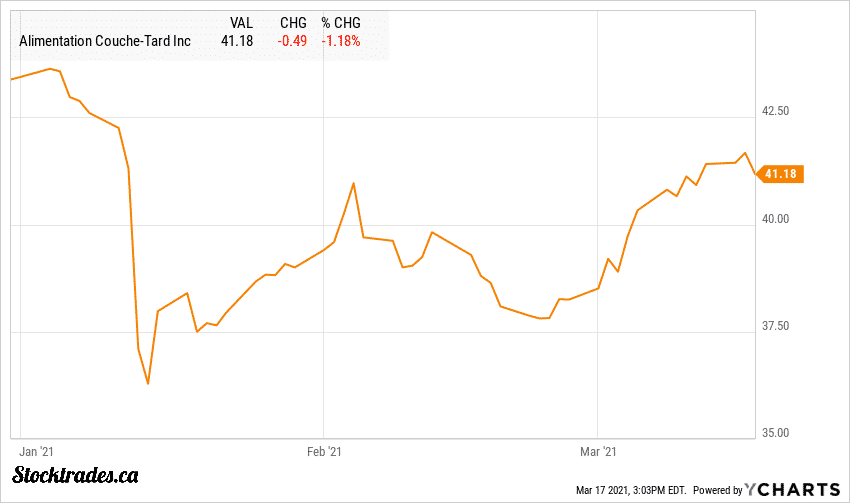Alimenatation Couche-Tard (TSE:ATD.B) is The Perfect Reopening Play

The COVID-19 pandemic has wreaked havoc on a lot of industries here in Canada and around the globe.
Now that it looks like we’re on the tail end of things, lots of people are looking for Canadian stocks that might provide somewhat of a re-opening play. If you’re just learning how to buy stocks in Canada, you’re often told to “buy low, sell high”. It’s a strategy that pays off quite often.
And in my opinion, Alimentation Couche-Tard (TSE:ATD.B) provides just that.
What does Alimentation Couche-Tard (TSE:ATD.B) do?
Alimentation Couche-Tard Inc operates a network of convenience stores across North America, Ireland, Scandinavia, Poland, the Baltics, and Russia.
The company primarily generates income through the sale of tobacco products, groceries, beverages, fresh food, quick service restaurants, car wash services, other retail products and services, road transportation fuel, stationary energy, marine fuel, and chemicals.
In addition, the company operates more stores under the Circle K banner in other countries such as China, Egypt, and Malaysia. Its operation is geographically divided into the U.S., Europe, and Canada. Revenue from external customers falls mainly into three categories: merchandise and services, road transportation fuel, and other.
At the time of writing, the company is one of the largest convenience store operators in the world.
Fuel sales have struggled, but will rebound in a big way in 2021
With the global pandemic causing fuel sales and overall oil demand to plummet in 2020, Couche-Tard was heavily impacted by the pandemic.
This is because as an operator of gas chains and convenience stores, fuel sales drive a large portion of its revenue.

Market Cap: $43.02 billion
Forward P/E: 14.04
Yield: 0.88%
Dividend Growth Streak: 11 years
Payout Ratio (Earnings): 8.95%
Payout Ratio (Free Cash Flows): Premium Members Only
Payout Ratio (Operating Cash Flows): Premium Members Only
1 Yr Div Growth Rate: 21.18%
5 Yr Div Growth Rate: Premium Members Only
Stocktrades Growth Score: Premium Members Only
Stocktrades Dividend Safety Score: Premium Members Only
This is evident in the chart above, when we can see that the overall impact due to the shutdowns in 2020 were extensive.
On a year over year basis, fuel sales fell 41% in the US, 41% in Europe, and 33% in Canada. The company also saw a drop in merchandise and service sales, which makes sense. If people aren’t fueling up, they aren’t going into stores to purchase other items or services as well.
This is why we’ve witnessed a 27% dip in total revenue for the company over the course of 2020.
A 27% year over year dip, especially with a company like Couche-Tard that has saw such strong growth over the last decade, is likely setting off alarm bells for investors who aren’t paying attention to the details.
Couche-Tard still managed to drive double digit earnings growth in 2020 despite the significant challenges it faced. So it’s safe to say that once the economy opens back up and fuel sales inevitably recover, the company is going to be in a strong position to deliver top and bottom line growth for at least 2021 and 2022, if not beyond.
To add to this, Couche-Tard is an underrated EV play
Couche-Tard has been quietly testing EV operations in Norway, with extremely positive results.
And because of this, the company plans to start rolling out EV charging stations in North America in 2021, and has even been directly quoted stating it would like to find a way to deliver at-home charging capabilities as well. On a side note, renewable energy stocks were a hot topic this year, we took a look at TransAlta Renewables (TSX:RNW).
Couche-Tard’s botched acquisition of Carrefour in late 2020, which I’ll talk about next, was in my opinion not only an attempt for the company to get into the grocery store business, but also deliver charging stations in that area as well.
There is a lot of speculation as to whether or not people will be willing to sit at a gas station to charge their vehicles. Because charging times are estimated to be in the 30-45 minute range, this seems a little excessive.
For a grocery store however, that timeline fits the mold perfectly. The acquisition attempt was puzzling to most, but I think the company had this in mind when making the attempt.
Couche-Tard’s acquisition attempt of Carrefour soured the market
It’s pretty safe to say that the market did not like the attempt by Couche-Tard to get into the European grocery business. In fact, if we look at the chart below, the company’s share price plummeted.

The reaction was mostly due to the magnitude of the purchase, along with the fact that current shareholders didn’t like the fact that Couche-Tard was expanding from a high margin business in fuel and gas station food sales, to a low-margin grocery store model.
But the thing is, when the acquisition was eventually squashed by the French government, it’s price didn’t recover. In fact, we can see now that the company is still trading well below that mid January collapse due to the acquisition news.
The dip in price and subsequent non-recovery has me puzzled, and the only reason I can think of is the fact that investors are hesitant in the company’s management now that it attempted the aggressive move.
However, if this is the primary reason for the stocks sideways move thus far in 2021, it’s simply unwarranted.
Couche-Tard is well positioned for growth
On a valuation basis, Couche-Tard is the cheapest it’s ever been over the course of the last decade.
The company is trading at only 12 times trailing earnings, which is well below industry averages, along with its 3, 5, and 10 year historical price to earnings numbers.
The company also boasts a price to earnings to growth ratio of 0.30, suggesting that the market is not pricing in the company’s forward growth trajectory.
A rebound of the economy and a return to normal will give Couche-Tard a long runway when it comes to growth, as we will see the company recover when it comes to fuel sales, all while continuing to provide the double digit earnings growth it did, even during the midst of a global pandemic.
